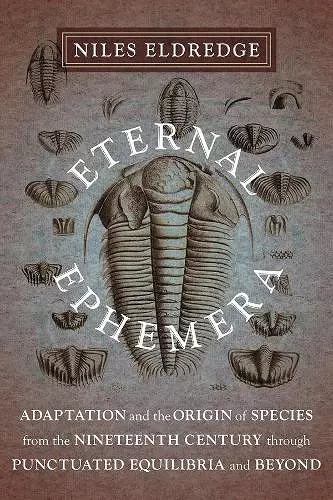Eternal Ephemera
Adaptation and the Origin of Species from the Nineteenth Century Through Punctuated Equilibria and Beyond
Format:Hardback
Publisher:Columbia University Press
Published:20th Mar '15
Currently unavailable, our supplier has not provided us a restock date

The origin, extinction, and evolution of species-interconnected in the web of life as "eternal ephemera"-are the concern of evolutionary biology. In this riveting work, renowned paleontologist Niles Eldredge follows leading thinkers from Lamarck and Darwin to his younger self, who, with Steven Jay Gould, who revitalized evolutionary science with their concept of punctuated equilibria. Filled with insights into evolutionary biology and told with a rich affection for the scientific arena, this book celebrates the organic, vital relationship between scientific thinking and its subjects.
From one of evolutionary biology's major contributors, a compelling work that unravels science’s great “Mystery of Mysteries”: how new species arise.All organisms and species are transitory, yet life endures. The origin, extinction, and evolution of species-interconnected in the web of life as "eternal ephemera"-are the concern of evolutionary biology. In this riveting work, renowned paleontologist Niles Eldredge follows leading thinkers as they have wrestled for more than two hundred years with the eternal skein of life composed of ephemeral beings, revitalizing evolutionary science with their own, more resilient findings. Eldredge begins in France with the naturalist Jean-Baptiste Lamarck, who in 1801 first framed the overarching question about the emergence of new species. The Italian geologist Giambattista Brocchi followed, bringing in geology and paleontology to expand the question. In 1825, at the University of Edinburgh, Robert Grant and Robert Jameson introduced the astounding ideas formulated by Lamarck and Brocchi to a young medical student named Charles Darwin. Who can doubt that Darwin left for his voyage on the Beagle in 1831 filled with thoughts about these daring new explanations for the "transmutation" of species. Eldredge revisits Darwin's early insights into evolution in South America and his later synthesis of knowledge into a theory of the origin of species. He then considers the ideas of more recent evolutionary thinkers, such as George Gaylord Simpson, Ernst Mayr, and Theodosius Dobzhansky, as well as the young and brash Niles Eldredge and Steven Jay Gould, who set science afire with their concept of punctuated equilibria. Filled with insights into evolutionary biology and told with a rich affection for the scientific arena, this book celebrates the organic, vital relationship between scientific thinking and its subjects.
Very cutting edge. The historical insights in this book are original and bring in interesting and important themes in the thinking about species and speciation. -- Donald R. Prothero, author of Evolution: What the Fossils Say and Why it Matters In this beautifully written book, Niles Eldredge explores not only how scientific views of the origins of species have changed over the past two hundred years but also why they have changed. It is an enthralling personal view of the history of one of the most difficult problems in evolution, written by a leading paleobiologist whose work has helped mold our understanding of the tempo and mode of the diversification of life. A sheer pleasure to read. -- John N. Thompson, University of California, Santa Cruz Niles Eldredge has been one of the most innovative and critical theoretical evolutionary biologists of the past forty years. Now he returns to the roots of modern evolutionary biology to set the stage for new helpful proposals that move evolutionary theory forward. This is required reading for anyone with a serious interest in evolutionary biology. -- Daniel Brooks, University of Toronto Paleontological and evolutionary pioneer Niles Eldredge has produced a scientific and scholarly gem of a book. Lucidly written, it covers the history and science of adaptation and the origin of species, with special emphasis placed on how paleontologists helped to build and expand the evolutionary synthesis. Everyone interested in evolution and paleontology will enjoy reading it. -- Bruce S. Lieberman, University of Kansas Eternal Ephemera is the most articulate and forceful presentation of the concept and implications of punctuated equilibria, originally formulated by Niles Eldredge and Stephen J. Gould, a concept that has played a major role in the research and development of the theory of evolution over the last four decades. Eldredge's scholarly and bibliographic analysis of the historical precedents, from before Darwin to the present, of the related concepts of taxic versus phyletic evolutionary change is impressive. Eternal Ephemera deserves to be read by every evolutionist. -- Francisco J. Ayala, University of California, Irvine Eternal Ephemera offers a brilliantly researched and highly readable context for understanding the development of Darwinian models of evolution. It is a book that should be read by everyone, and perhaps especially those who have questions about evolution. -- Simon Underdown Times Higher Education A must-read for armchair biologists! Booklist (*Starred Review) A meticulously researched history of evolutionary theories that will likely be unfamiliar to most readers. Science A masterful work by one of the most influential paleontologists of the past half century, this is a must read for every serious student of evolutionary biology. Choice A clear, useful, and well-written book that critically discusses and analyzes the rise and decline of the taxic perspective in biology and paleontology from the early nineteenth century onwards. History and Philosophy of the Life Sciences Fascinating and well-written. Isis
- Winner of Choice Outstanding Academic Title 2015
ISBN: 9780231153164
Dimensions: unknown
Weight: unknown
416 pages